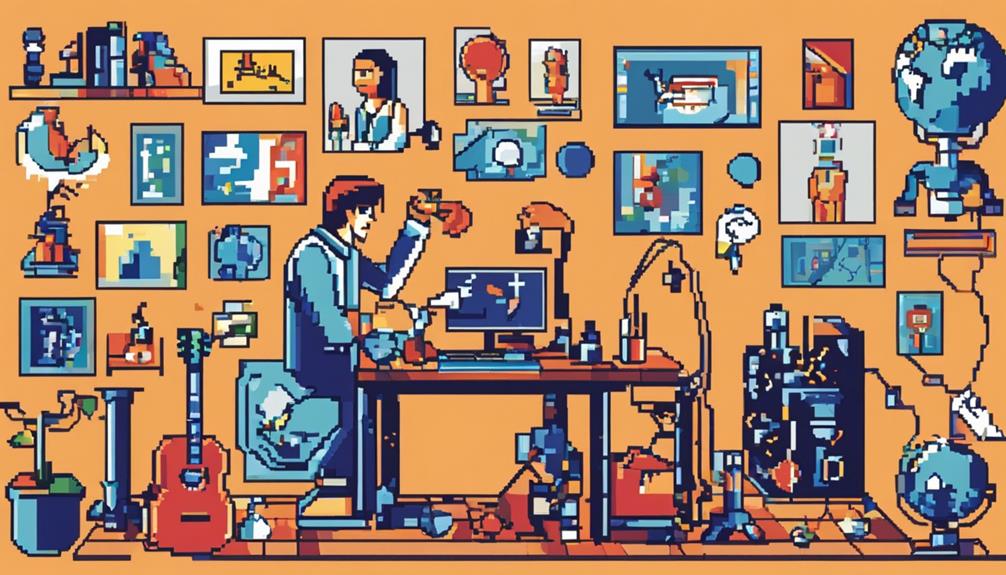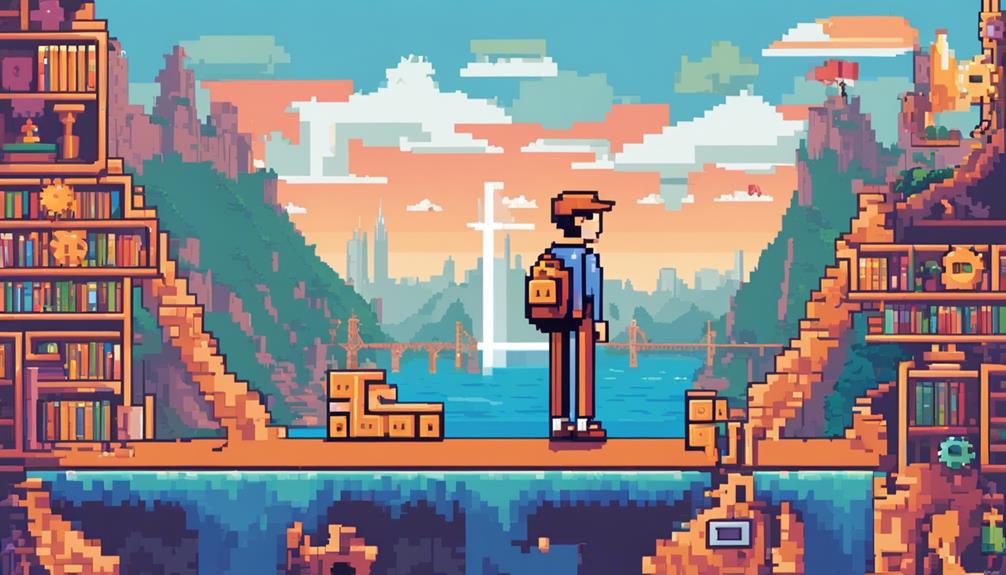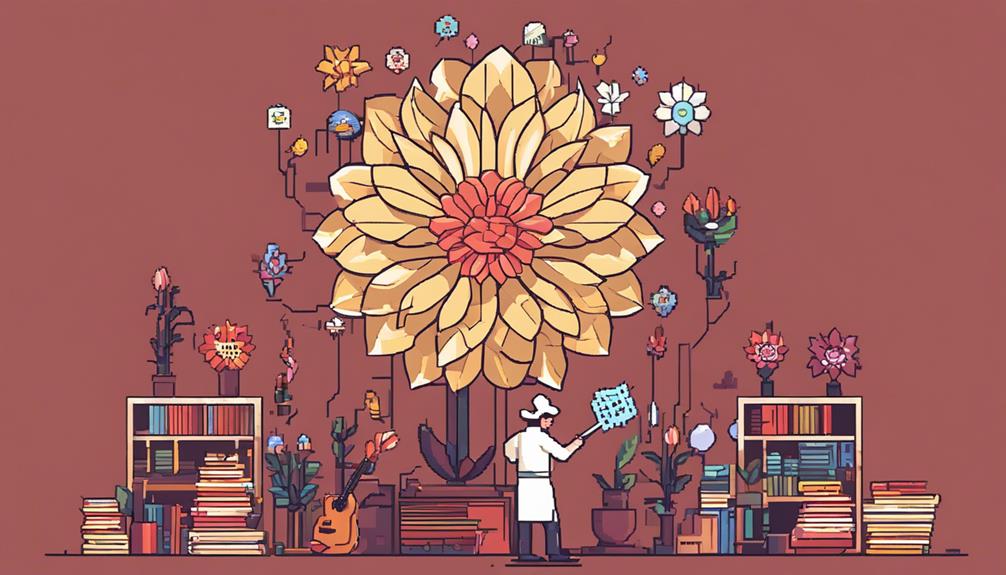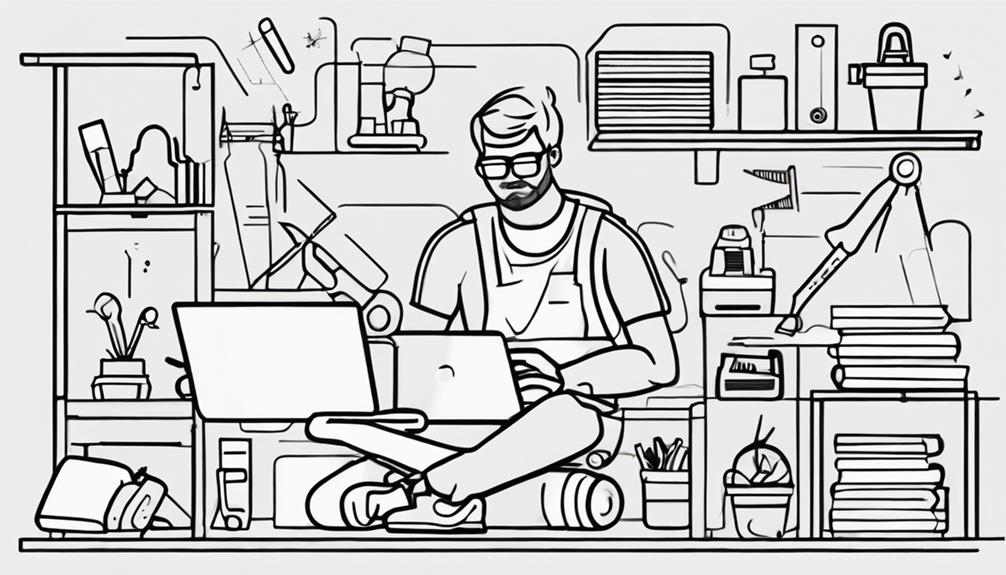You're already on a path of self-improvement by recognizing the importance of lifelong learning, a mindset that can reveal your full potential and help you navigate life's challenges with confidence and adaptability. By prioritizing continuous learning, you'll stay relevant in a rapidly changing world, develop new skills, and enhance your cognitive flexibility. Embracing new experiences and challenges will foster a growth mindset, leading to personal growth and a more fulfilling existence. As you explore the world of lifelong learning, you'll discover new ways to unveil your potential and thrive in a world where adaptability is key to success – and there's so much more to explore ahead.
Key Takeaways
- Embracing a growth mindset facilitates tapping into the wisdom of ancient philosophers and enhances adaptability, agility, and openness to new experiences.
- Prioritizing self-improvement through continuous learning equips individuals to navigate life's challenges, fosters curiosity, and promotes a fulfilling existence.
- Acquiring new skills and knowledge is necessary for staying ahead in a fast-paced world, adapting to rapid changes, and enhancing cognitive flexibility.
- Diversifying learning areas and interests through reading, online courses, and new hobbies enriches life, uncovers hidden passions, and promotes continuous learning.
- Cultivating a growth mindset by embracing challenges, overcoming self-doubt, and learning from failures develops resilience, perseverance, and confidence for personal growth.
Embracing Lifelong Learning Philosophy
By embracing a growth mindset, you can tap into the wisdom of ancient philosophers like Aristotle, Socrates, and Plato, who advocated for continuous mental development as a lifelong pursuit. This lifelong learning philosophy is about acquiring new knowledge and skills throughout your life, improving your adaptability, agility, and openness to new experiences.
By embracing lifelong learning, you're not only expanding your capabilities but also combating cognitive decline. Studies have shown that learning rewires the brain, creating new neural paths and keeping your mind sharp. As you continue to learn, you'll become more skilled at adapting to new situations and challenges.
This mindset allows you to approach life with a sense of curiosity and wonder, always seeking new experiences and knowledge. By making lifelong learning a priority, you'll be better equipped to navigate life's twists and turns, and stay true to your commitment to self-improvement.
Staying Relevant in a Changing World

As you navigate the ever-changing landscape of technology, economy, and workforce, you're probably wondering how to stay ahead of the curve.
The truth is, acquiring new skills is no longer a nicety, but a necessity to remain relevant in today's fast-paced world.
New Skills Ahead
You're entering a job market where the Fourth Industrial Revolution has rewritten the rules, demanding you stay ahead of the curve by constantly acquiring new skills to remain relevant.
To keep learning and stay competitive, it's important to focus on developing a diverse range of skills. Here are three key areas to prioritize:
- Digital literacy: With technology advancing at an incredible pace, it's vital to stay up-to-date with the latest tools and platforms.
- Soft skills: Employers value candidates with strong communication, collaboration, and problem-solving skills, making these crucial for career growth.
- Industry-specific skills: Stay ahead of the curve by learning about the latest trends and technologies in your industry, ensuring you remain an expert in your field.
Adapting to Change
Staying adaptable in a rapidly changing world requires embracing lifelong learning as a mindset, not just a skillset. As you navigate the ever-evolving landscape of your profession, adapting to change becomes essential for survival.
The Fourth Industrial Revolution has accelerated the need for upskilling and reskilling to meet evolving job demands. By committing to lifelong learning, you'll not only stay relevant but also open yourself up to new opportunities. Embracing this mindset allows you to be more receptive to change, making you a valuable asset to employers.
In fact, studies show that individuals who prioritize lifelong learning are more adaptable to change and thrive in dynamic work environments. By rewiring your brain through continuous learning, you'll combat cognitive decline and enhance cognitive flexibility.
Diversifying Learning Areas and Interests

You're already committed to staying relevant in a changing world, but now it's time to think beyond professional skills. What personal interests have you been wanting to explore, and how can you make time for them?
Beyond Professional Skills
By venturing beyond the confines of professional skills, you open yourself up to a world of diverse learning areas and interests that can enrich your life in profound ways. This curiosity-driven approach to lifelong learning can lead to a more fulfilling and well-rounded existence.
You can explore new hobbies and interests, such as art, music, or cooking, which can provide an invigorating break from professional development while still promoting continuous learning.
Here are three ways to diversify your learning areas:
- Read daily: Expand your knowledge and skills beyond the workplace, fostering a well-rounded individual.
- Explore online courses: Technology offers diverse learning opportunities, from online courses on coding to YouTube tutorials on photography.
- Try new hobbies: Engage in activities that bring you joy and excitement, such as painting or playing a musical instrument.
Personal Interest Exploration
Immerse yourself in personal interest exploration to discover hidden passions and talents, and unveil how they can enrich your life. By diversifying your learning areas, you'll lead a more enriched life, filled with new experiences and skills.
Reading daily can cultivate a habit of continuous learning and intellectual growth, allowing you to explore various interests. You can learn new things, such as playing a musical instrument, cooking, or even coding.
Technology has made learning diverse, limitless, and easily accessible for personal growth. Take advantage of online resources like audiobooks, YouTube, and podcasts, which offer varied opportunities for expanding your interests and skills. You can learn new languages, explore different cultures, or even start a new hobby.
Personal interest exploration is a journey that can lead to discovering hidden talents and passions. By committing to continuous learning, you'll reveal new doors and open yourself up to endless possibilities. So, start exploring today and watch your life transform in amazing ways!
Bridging the Skills Gap Through Education

One significant obstacle India faces in its pursuit of economic growth is the massive skills gap that hinders its workforce's productivity and employability. As you aim to make self-improvement a lifelong pursuit, bridging this gap through education becomes vital. You can empower yourself by acquiring the skills demanded by the industry, making you more employable and contributing to the country's economic growth.
To bridge the skills gap, you can focus on the following:
- Accessibility: Guarantee that quality education is accessible to all, regardless of geographical or socio-economic barriers.
- Digital literacy: Prioritize digital literacy to equip yourself with the skills required to thrive in a rapidly digitizing economy.
- Industry-aligned skill development: Enroll in programs that address the specific skill demands of industries, making you a valuable asset to potential employers.
Cultivating a Growth Mindset

As you work on cultivating a growth mindset, you'll find that pushing yourself out of your comfort zone and taking on new challenges is crucial. By doing so, you'll not only build resilience but also foster a sense of curiosity that will drive you to learn and grow.
Embracing New Challenges
You take the first step towards cultivating a growth mindset by recognizing that challenges aren't obstacles to be feared, but opportunities to be seized. By embracing new challenges, you open yourself up to learning something new and developing your skills. This mindset allows you to believe in your ability to improve through effort and perseverance, leading to higher achievement, resilience, and overall well-being.
When you take on new challenges, you can expect to:
- Develop problem-solving skills: By facing new challenges, you'll be forced to think creatively and come up with innovative solutions.
- Increase creativity: Embracing new challenges stimulates your mind, allowing you to think outside the box and explore new ideas.
- Gain personal growth: Overcoming challenges builds confidence and self-awareness, helping you grow both personally and professionally.
Fostering Curiosity Daily
By embracing new challenges, you've already taken the first step towards cultivating a growth mindset, and now it's time to fuel that growth by fostering curiosity daily, seeking out new opportunities for learning and development.
This involves engaging in daily activities that spark your curiosity, whether it's reading about a new topic, taking an online course, or trying a new hobby. By doing so, you'll be more likely to develop a growth mindset, which will help you view failures as opportunities for growth and learning.
Research shows that individuals with a growth mindset are more likely to seek out new opportunities for learning and development, leading to increased creativity, problem-solving skills, and resilience. Cultivating curiosity daily will also lead to a more fulfilling and enriched life, as you constantly seek new knowledge and experiences.
Parenting and Fostering Lifelong Learning

Modeling a love for learning yourself is key to instilling this value in your children, as they're more likely to adopt lifelong learning habits when they see them in action. As a parent, you have the power to shape your child's attitude towards learning, and it starts with your own behavior. By demonstrating a growth mindset and enthusiasm for learning, you'll inspire your kids to do the same.
Here are three ways to foster a love for learning in your children:
- Limit screen time: Excessive screen time can have a negative impact on your child's learning habits. By setting limits, you'll encourage them to explore other activities that promote learning, such as reading or engaging in hobbies.
- Practice what you preach: If you're interested in digital marketing, for instance, share your knowledge with your child and explore it together. This will show them that learning is a lifelong process that's relevant to everyday life.
- Make learning a family affair: View education as a year-round process that extends beyond traditional school hours. Engage in activities that promote learning as a family, such as visiting museums or participating in science projects. By doing so, you'll create a culture of lifelong learning that will benefit your child in the long run.
Role of Homeschooling in Education

As you consider alternative approaches to education, homeschooling stands out as a highly effective way to instill a lifelong love for learning in your children. By taking an active role in their education, you can create a personalized and flexible learning environment that caters to their unique learning style and interests. Homeschooling empowers you to integrate education into everyday life, never stopping at traditional school hours.
This approach fosters a deeper understanding of subjects and promotes critical thinking skills through hands-on experiences. Your children will have the opportunity to explore diverse subjects and activities that may not be available in traditional school settings. By homeschooling, you can instill a love for learning that will never stop, encouraging your children to continue exploring and growing throughout their lives.
Trying New Things for Personal Growth

How do you react when faced with an opportunity to try something entirely new, something that has the potential to reveal a hidden talent or passion? Do you seize it with excitement or shy away in fear of the unknown?
Trying new things is essential for personal growth, as it allows you to step out of your comfort zone and discover new interests and talents.
By trying new activities, you can:
- Expand your horizons: You might stumble upon a new passion or interest that you never knew you had.
- Overcome self-doubt: Pushing past initial doubts can help you discover hidden talents and build confidence.
- Learn from failures: Embracing failures as learning opportunities can help you develop resilience and perseverance.
Importance of Positive Role Models

One influential figure can spark a chain reaction of self-improvement by embodying a growth mindset and inspiring others to do the same. As you surround yourself with positive role models, you'll notice their impact on your own journey of self-improvement.
These individuals demonstrate resilience and perseverance in the face of challenges, setting a powerful example for growth. They encourage a growth mindset by trying new things, fostering a culture of continuous learning. By creating a supportive environment for exploration and learning, they boost your confidence and motivation to improve.
When you're around positive role models, you're more likely to be open to new experiences and challenges, paving the way for a fulfilling journey of lifelong learning. You'll find yourself inspired to take on new challenges and push beyond your comfort zone.
With positive role models in your life, you'll be more motivated to prioritize your own self-improvement, leading to a more purposeful and fulfilling life.
Prioritizing Continuous Learning and Development

You'll find that the positive role models in your life often embody a growth mindset by prioritizing continuous learning and development, a habit that's vital for staying adaptable and open to new experiences. By making continuous learning a priority, you'll enhance your adaptability, agility, and openness to new experiences. This habit rewires your brain, creates new neural paths, and combats cognitive decline effectively.
Here are three key benefits of prioritizing continuous learning and development:
- Upskilling and reskilling: In the professional landscape, continuous learning is essential for expanding your capabilities and job prospects. By upskilling and reskilling, you'll stay competitive and enhance your employability.
- Personal growth: Diversifying your learning areas beyond professional skills to personal interests enriches your life with knowledge and practical skills. You'll develop new passions and hobbies, leading to a more fulfilling life.
- Bridging the skills gap: Continuous learning helps bridge the skills gap, making you more attractive to potential employers and addressing industry demands.
Frequently Asked Questions
Why Is Learning a Lifelong Pursuit?
You're probably wondering why learning is a lifelong pursuit – it's because you're constantly evolving, and the world around you is changing fast. You need to stay ahead, adapt, and grow to remain relevant and fulfilled.
Who Said Never Stop Learning Because Life Never Stops Teaching?
You're like a sponge, soaking up knowledge, and the phrase "never stop learning" is echoed by many, but it's often attributed to Robert T. Kiyosaki, who emphasizes the importance of continuous learning in his book "Rich Dad, Poor Dad".
Why Is Learning a Lifelong Process?
You realize that learning is a lifelong process because your brain constantly adapts, and the world around you rapidly changes, requiring you to stay updated and acquire new skills to remain relevant and competitive.
What Is a Lifelong Learning Goal?
You're setting a lifelong learning goal, which means you're committing to continuously acquire new knowledge and skills throughout your life, staying relevant in your career and personal life, and achieving personal growth.
How Can I Make Self-Improvement a Lifelong Pursuit?
To make self-improvement a lifelong pursuit, it’s essential to focus on fueling selfimprovement passion lifelong. Set goals, stay curious, and seek new challenges. Continuously learn and grow, embrace failure, and adapt to change. Surround yourself with positive influences and never settle for mediocrity. Keep the fire of self-improvement burning.
Conclusion
As you set out on this lifelong pursuit of self-improvement, remember that the journey is the destination.
Like the ancient Greek philosopher, Aristotle, who believed that 'the whole is more than the sum of its parts,' your continuous learning and development will lead to a life of purpose and fulfillment.
By embracing lifelong learning, you'll open up new opportunities, nurture a growth mindset, and stay relevant in a rapidly changing world.
So, never stop learning, and the world will be your oyster.










